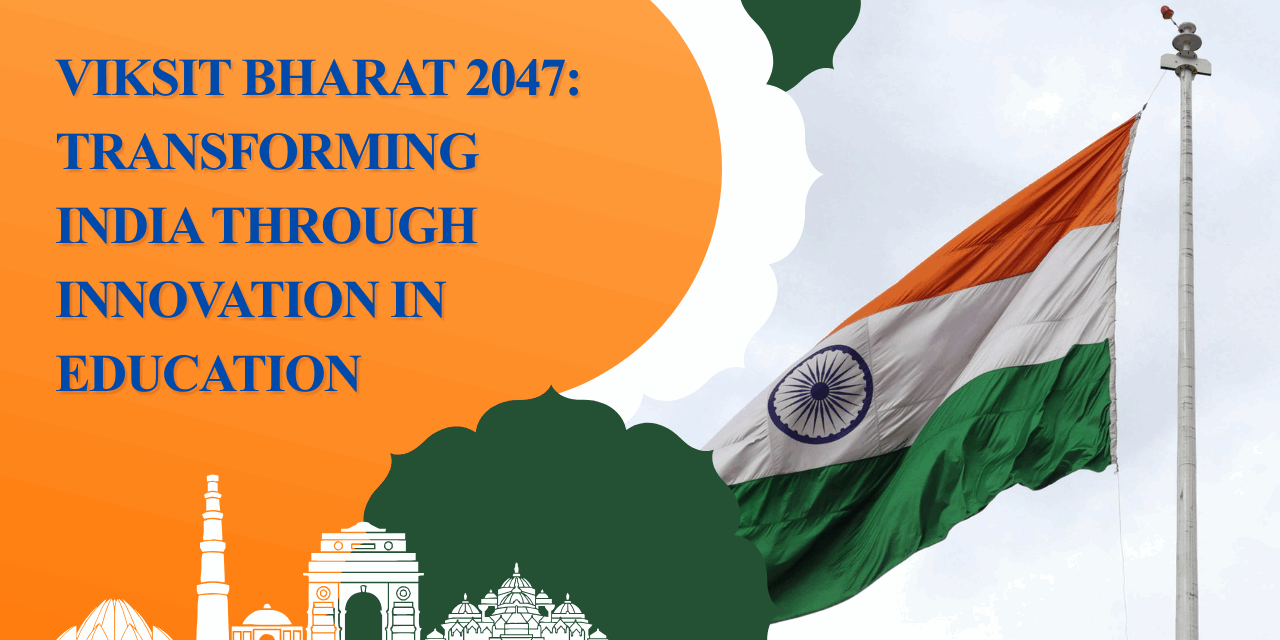Viksit Bharat 2047: Transforming India through Innovation in Education
-By Vineet Handa
As we approach the 100th anniversary of India’s independence, the vision of a “Viksit Bharat” (Developed India) is gaining momentum. The concept, championed by the government and echoed by organizations like the RSS with their vision of “Smridh aur Mahaan Bharat” (Prosperous and Great India), aims to transform India into a developed nation by 2047. At the heart of this vision is the National Education Policy (NEP) 2020, which seeks to revolutionize the Indian education system and equip the country with the skills and knowledge needed to become a global powerhouse.
The Role of Innovation in Education
Innovation in education is not just about adopting new technologies; it’s about rethinking the way we teach and learn. For Viksit Bharat 2047, innovation in education will play a pivotal role in:
– Creating a Knowledge Economy: By equipping India’s vast youth population with critical thinking, problem-solving, and creative skills, innovation in education will enable the country to become a global knowledge superpower.
– Driving Economic Growth: By fostering a culture of research, innovation, and entrepreneurship, the education system can produce a workforce that can create new businesses, products, and services, driving India’s future economic growth.
– Solving Societal Challenges: Innovation in education will help develop sustainable, scalable, and practical solutions to India’s real-world problems in sectors like agriculture, healthcare, and infrastructure.
– Promoting Self-Reliance: By encouraging indigenous research and development, the education system can help India become more self-reliant and reduce its dependence on foreign technologies.
– Aligning with Global Standards: The reforms and innovations in education aim to align Indian talent with global education standards, making the workforce competitive on an international stage.
Required Changes and Areas of Focus
To achieve the vision of Viksit Bharat 2047, significant changes are needed in the Indian education system. These changes are guided by the principles of the NEP 2020 and a forward-looking approach. Some key areas of focus include:
1. Shift from Rote Learning to Holistic and Skill-Based Education: The education system needs to move away from memorization and towards cultivating skills like critical thinking, creativity, communication, and collaboration.
2. Technology-Driven Transformation (Education 4.0): Leveraging technology to personalize learning, enhance accessibility, and create interactive learning experiences is crucial for achieving the vision of Viksit Bharat 2047.
3. Strengthening Research and Innovation Ecosystems: Fostering partnerships between universities and industries, providing strategic direction and funding for research, and encouraging a research mindset are essential for driving innovation in education.
4. Teacher Training and Empowerment: Teachers need to be equipped with the necessary digital literacy skills and modern pedagogical techniques to effectively utilize technology in the classroom.
5. Governance and Policy Reforms: Outcome-based assessments, institutional autonomy, and streamlined processes are vital for accelerating innovation and achieving the vision of Viksit Bharat 2047.
Additional Initiatives to Foster Innovation and Entrepreneurship
To further enhance the educational experience and promote innovation and entrepreneurship, the following initiatives can be considered:
– Attracting Foreign Universities: Establishing partnerships or campuses in India to offer diverse courses and research opportunities.
– Exchange Programs: Facilitating student and faculty exchanges between Indian and foreign institutions to promote knowledge sharing and cultural understanding.
– Scholarships: Providing financial support to students pursuing higher education or research in India or abroad.
– Startup Funding: Offering financial support to students and young entrepreneurs to develop innovative products or services during their college or university years.
– Earn While You Learn: Encouraging experiential learning, internships, and industry partnerships to help students gain practical skills and earn a stipend or income while studying.
– Industry-Academia Collaborations: Fostering partnerships between educational institutions and industries to promote research, innovation, and skill development.
– Mentorship Programs: Pairing students with experienced professionals or entrepreneurs to guide them in their academic and professional pursuits.
– Innovation Hubs: Creating spaces that encourage creativity, innovation, and entrepreneurship among students and faculty.
Conclusion
Innovation in education is the key to unlocking India’s potential and achieving the vision of Viksit Bharat 2047. By transforming the education system and equipping the country with the skills and knowledge needed to become a global powerhouse, we can create a brighter future for India and its people.






